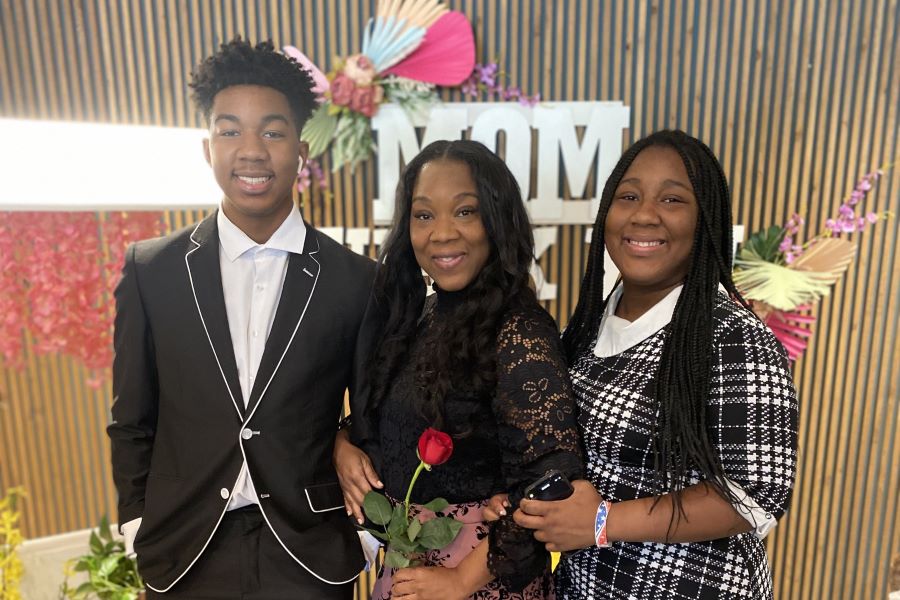
This story contains content that could potentially be triggering and includes mentions of domestic and gun violence.
When Hurricane Wilma destroyed her family’s home in Florida, Tamara S. and her husband decided to relocate to Atlanta to start anew. In Atlanta, Tamara — recently graduated from nursing school — experienced the nursing world first-hand. In 2013, after several years of working at a different hospital, Tamara joined Northside Hospital Gwinnett as a PRN.
At Northside, Tamara began growing in her career. She started in the trauma unit as a PRN and became a clinical instructor for nursing students, later transferring to the cardiovascular ICU and then becoming a supervisor on a gastrointestinal floor.
In September 2021, however, Tamara, who had dedicated her career to healing others, became a patient in her own hospital’s trauma unit.
After 16 years of marriage, the cracks in her relationship had become undeniable.
“The signs of danger were there,” Tamara recalled. “But I was in denial for a long time.”
The abuse Tamara faced was sporadic and she convinced herself it wasn’t a domestic violence situation, but as she and her husband faced divorce, his behavior took a deadly turn. On what seemed like an ordinary day, Tamara came home from her shift to an argument that escalated in an unimaginable way. After retreating from the argument, Tamara thought the matter would be settled and was surprised to see her husband emerge in their living room with a gun in his hand, pointed at her.
“Are you really going to shoot me over a bathroom door?” Tamara remembered asking.
Before she could react, her husband shot her six times, before taking his own life. Their two teenage children were home, and their daughter, 13 at the time, called the police while her son, 15 at the time, carried out the 911 operator’s instructions.
“The scene was overwhelming, but I remember my children were both bold and courageous. My son coached me through his tears until paramedics arrived. I still remember being in my scrubs, knowing exactly what was happening to me. I never lost consciousness, so I was looking at the patient experience from a perspective I’d never been in,” Tamara said. “I still get chills thinking about it all.”
While her kids’ quick action to call 911 and administer lifesaving emergency care likely saved Tamara’s life, her recovery would be an uphill battle. Four bullets had pierced her abdomen, one had hit her chest and another her hip. She was rushed to the ICU and placed on a ventilator.
“I didn’t know if I’d make it, but I accepted the reality of what had happened. But it was hard. It is hard to reconcile that the person I knew and had loved was the person who did this to me,” Tamara explained.
Her recovery was grueling. During her first physical therapy session, she couldn’t even walk. As a woman of faith, she leaned on her beliefs and was determined to heal — not only for herself, but for her children. Over time, as she recovered, she found new purpose in her survival.
“I knew what my patients were feeling in ways I never could have imagined before,” Tamara said. “When they look at me, I want them to see someone who understands — not just as a nurse, but as a survivor.”
She has been forthcoming with her story and recounts it to patients who need inspiration to persevere.
Tamara shared, “I tell them, ‘If I can come back to this work after everything I have been through, you can also find the strength to get better and remake your life.’”
After her recovery, she returned to work on the trauma team as a clinician, or unit educator, channeling her experience into compassion and purpose. Her presence became a beacon of hope for patients navigating their own recoveries and for the colleagues whom she encountered in the halls and remembered her resilience during her treatment and after recovery.’
“My experience is more than ‘I survived.’ My experience is about turning my survival into something that helps others heal. I survived, and my life is completely changed, for the better. I want to help other patients recognize that can be true for them too.”
If you or a loved one is experiencing domestic violence or needs help leaving a situation, contact your local authorities or doctor, who can provide resources and guidance. Help and resources are available.
Learn more about Northside Hospital’s Trauma Services and find educational resources.
*The health story shared here is for informational purposes only and is not medical advice. Patients should consult with their own physician before making medical decisions.
